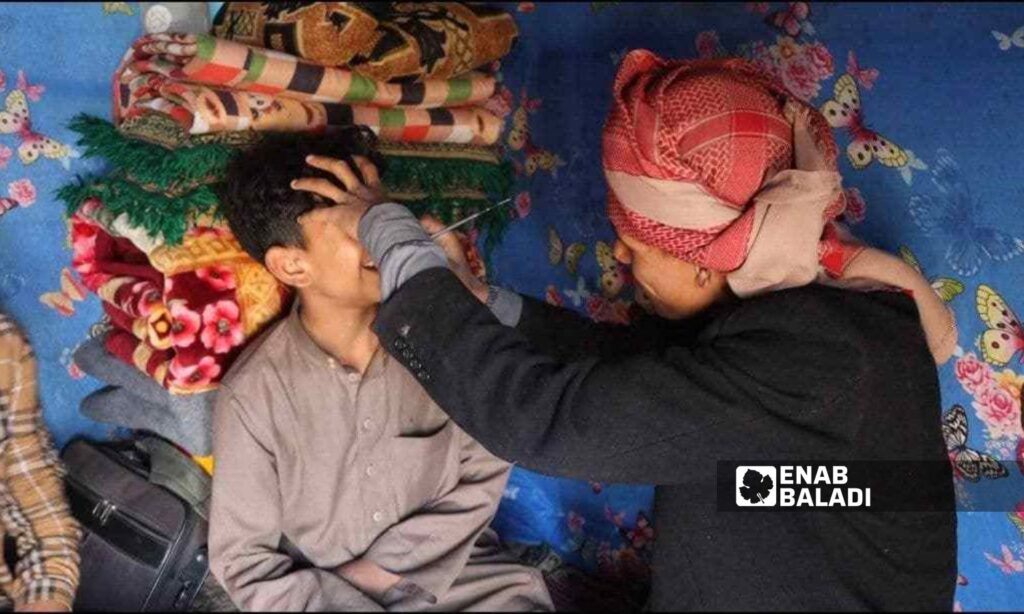Deir Ezzor – Obadah al-Sheikh
In the countryside of Deir Ezzor, dental care has become inaccessible for residents due to the high fees of dentists, leading some to seek temporary solutions like taking painkillers, or radical solutions by deciding to extract teeth instead of treating them. Many resort to itinerant “Qurbat” or Dom people due to the lower cost of their services, despite them performing unlicensed and low-quality work.
The high cost of dental care negatively impacts a segment of the population, as some of those interviewed by Enab Baladi described continuing treatment and seeing a dentist as “almost impossible.”
In the area controlled by the Autonomous Administration of North and East Syria (AANES) in the countryside of Deir Ezzor, which extends east of the Euphrates River, dentists struggle with obstacles in obtaining medical equipment and operational costs, in addition to the scarcity of dentists in the region.
Bearing the pain due to costs
The feeling of toothache has become a constant concern for a wide segment of residents in the countryside of Deir Ezzor, due to the high cost of treatment. For example, Marwa al-Abd (29 years old) told Enab Baladi that the cost to treat three decayed teeth reached close to 100 US dollars.
The woman, who hails from the town of Abriha east of Deir Ezzor, added that she has not treated the decay in her teeth since its appearance years ago, which has exacerbated her condition today, and resulted in financial costs beyond her means.
Al-Abd described the costs as “exorbitant”, which pushed her to consider extracting the affected teeth to relieve the pain without considering the consequences that may ensue.
The situation is not much different for Amer al-Najm (35 years old). He does not have the luxury of accessing a dentist, especially since he works at one of the sewing workshops in the town of Tayyana, east of Deir Ezzor.
Al-Najm relies on temporary solutions, but first looks at their cost. He told Enab Baladi that he uses cloves as an anesthetic and pain reliever for his toothaches, instead of buying pain-relief medications, due to the high cost as well.
The young man said he is unable to find a permanent solution for his tooth pain, given the difficult living conditions he is going through, as he is unable to support his family of four.
Challenges faced by dentists
Dr. Ahmad Munir, who owns a clinic in the countryside of Deir Ezzor, told Enab Baladi that only about 25% of people in the countryside of Deir Ezzor can afford to fix their teeth, due to the high costs of materials and medical fees.
He added that the cost of a root canal reaches 75,000 Syrian pounds (approximately five dollars), and the patient needs several sessions to complete the treatment.
The doctor pointed out that the prices are “reasonable”, but the main obstacle is the decline in income levels among the area’s residents.
The dental community also faces difficulty in obtaining their basic materials, the doctor said, whether anesthesia materials, special needle heads, or permanent and temporary dental fillings.
He also mentioned that most of the medical materials and dental clinic supplies are brought from outside the Autonomous Administration-controlled areas, especially from Damascus or Aleppo provinces, and some of them come from Turkey or Iraqi Kurdistan.
The doctor attributed the unavailability of medical materials to the absence of dental warehouses in the countryside, which are mainly concentrated in cities. Transporting these materials between cities incurs additional costs, which are added to the prices of medical consultations in the area.
The absence of dental laboratories in the countryside of Deir Ezzor stands as a barrier to the activities of dentists in the region, according to the doctor. Samples are sent to al-Hasakah and Raqqa provinces, where laboratories are concentrated, and the doctor waits for their return to complete his work.
Moreover, he mentioned that changes in the exchange rates of the dollar play an important role and are among the difficulties faced by the dental community in the province.
A responsible source in the health committee affiliated with the Autonomous Administration in the countryside of Deir Ezzor, who preferred to remain anonymous as he was not authorized to speak to the media, told Enab Baladi that the small number of dentists in the region, the high cost of materials, in addition to the decline of the Syrian pound and rising fuel prices, reflect on the prices of consultations.
He added that most dentists use private power generators to operate their medical devices due to the lack of electricity in the area, along with several other factors that contributed to the increase in costs.
Resorting to the “Qurbat” as an alternative
There has been an increase in demand for the expertise of the itinerant “Qurbat” who work in “dental maintenance,” given the significantly lower prices of their services compared to dental clinics.
Ahmad Abu Rashid, from the Dom people, works in the profession of dental installation, which he inherited from his father and grandfather before him. He told Enab Baladi that dental fitting prices vary depending on the type, but range between 25,000 and 82,000 Syrian pounds.
He added that he earns his living through customers contacting him by phone to perform the evaluation at their homes. He and others also roam markets and villages in search of customers.
Residents of the Deir Ezzor countryside interviewed by Enab Baladi believe that developing health centers and introducing dental clinics that provide free services could alleviate the burden on the region’s people.
Hospitals and medical centers in the Autonomous Administration-controlled countryside of Deir Ezzor lack many services, such as dental and ophthalmic clinics, among other specializations.

